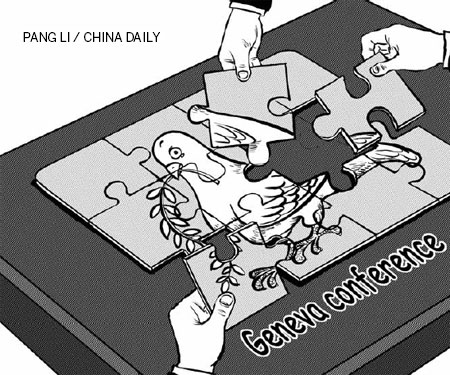UN, China natural partners in peace

The United Nations welcomes the increasingly important role China has been playing across many areas of our (the UN's) work, including international peace and security. We share China's view that peace and development go hand in hand. We welcome China's determination to promote the reform of global governance with the UN at its core. We see China - with its long-term strategy of peaceful development, reform and opening-up - as our natural partner in this endeavor.
Our efforts to strengthen the UN's ability to prevent and resolve armed conflicts in fact mirror China's pursuit of the "3Cs" - comprehensive, cooperative and common security.
Regrettably, prevention does not always work. However, even in cases where it has clearly failed, such as Syria or the Central African Republic, good offices offer a potentially successful path back to security and reconciliation: diplomacy must continue to prod the parties to step back from the brink and face each other around a negotiating table. Political challenges lie at the center of most conflicts and are the key both to their prevention and their resolution. Only by finding political solutions can we ensure that peace, when it does come, actually holds over the long term.
Along with UN Secretary-General Ban Ki-moon, I will be in Geneva for the peace conference on Syria. We have worked very hard to get both sides to the negotiation table. We still don't know if we will succeed. But we see this as the best hope for achieving a political solution that can end the appalling violence in Syria.
The UN secretary-general has long emphasized that there is no military resolution to the Syrian crisis, and the attempts both of the government and the opposition forces to impose a military solution has created a humanitarian catastrophe. It should be obvious to all that the cost of a military approach is simply too high.
We are grateful to China for supporting the June 30, 2012 Geneva communiqu, which holds out the promise of a political resolution in Syria. We are also grateful to China for supporting the removal of (and helping remove) chemical weapons from Syria.
Experience over the years has taught us a number of lessons about what works in preventive diplomacy and mediation as critical elements. China, too, has accumulated important knowledge in this regard. We are highly interested in hearing its views, learning from its lessons and exchanging experiences.
We have learnt that reaching a trouble spot early is critical. This is not simply about getting the necessary information at an early stage of a conflict, but also about mobilizing rapid, effective and unified diplomatic action as soon as opportunities present themselves. As a permanent member of the UN Security Council, China's role is essential, because we need Security Council support for early engagement.
Second, early engagement is only part of the puzzle. We also need to be skilled at what we do. Preventive diplomacy and mediation are complex and increasingly specialized fields, which require expertise in a wide array of areas, some quite technical. We have therefore focused on building up expertise that can be rapidly used and made available to UN envoys, regional organizations and UN member states.
Third, partnerships are key. The crises we face are often too complex for any one organization or member state to address alone. In a world where the nature of conflict has evolved, where terrorism and trans-national crime often intersect with political grievances, partnerships have become all the more important. The UN, under the leadership of the secretary-general, is working ever more closely with regional and sub-regional actors, such as with the League of Arab States on Syria and with the African Union on Somalia and Mali. Our cooperation with the Shanghai Cooperation Organization provides a solid foundation for engaging with this region and we stand ready to work even more closely together.
Fourth, perhaps the most important ingredient for success in preventive diplomacy is leverage. The UN secretary-general commands no battalions and has no treasury. The tools he has at his disposal are largely the power of persuasion, the principles of the UN Charter and the legitimacy that derives from common approach.
These are powerful tools in their own right. They reflect a shared understanding among member states, refined through decades of practice, and are applicable universally. But to be effective, they require that the international community, especially the major global powers, be closely aligned, empowering the secretary-general to speak on behalf of the international community.
In Syria, we see how hard it is to make progress when this unity of purpose is not present. In Mali and Yemen, on the other hand, the international community was able to move quickly to prevent the situations from deteriorating further.
To realize "comprehensive, cooperative and common security", the case for diplomacy - and ideally preventive diplomacy - is compelling and we know that it works. Our experience tells us that if we reach the trouble spots early through skilful diplomatic initiatives, backed by the unified stand of the international community and the necessary resources, and in partnership with regional organizations, we can be successful in either preventing a conflict or keeping it in check.
China is a key actor in this endeavor. Its voice needs to be heard both on specific cases and in general debates about a 21st century approach to these vital global governance issues. This is why this dialogue is so important and why, I hope, it will grow and flourish in the years ahead. We are confident that our partnership with China will contribute to making the world more peaceful, secure and prosperous.
The author is United Nations under-secretary-general for political affairs. The article is an excerpt from a speech that he delivered at a recent conference on "Transformative Global Governance: China and the United Nations".


















